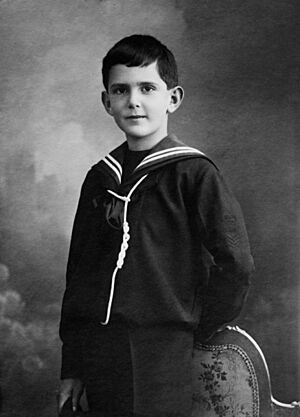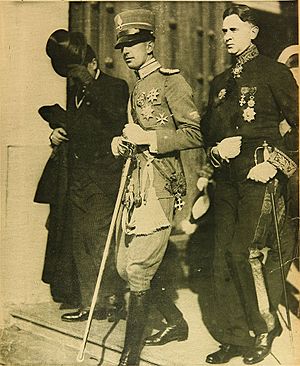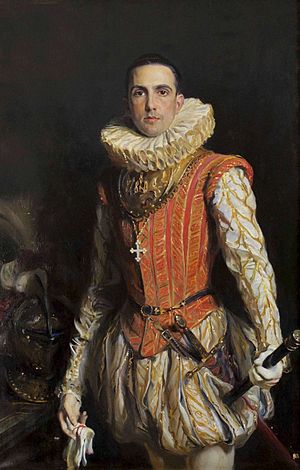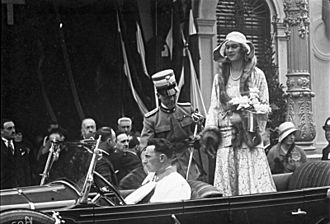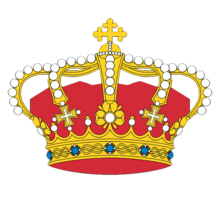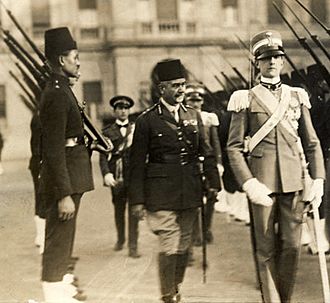Umberto II of Italy facts for kids
Quick facts for kids Umberto II |
|||||
|---|---|---|---|---|---|
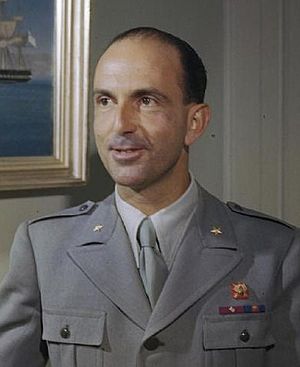
Umberto, then the Prince of Piedmont, in 1944
|
|||||
| King of Italy (more...) | |||||
| Reign | 9 May 1946 – 12 June 1946 | ||||
| Predecessor | Victor Emmanuel III | ||||
| Successor | Monarchy abolished Enrico De Nicola as President |
||||
| Prime Minister | Alcide De Gasperi | ||||
| Born | 15 September 1904 Racconigi, Piedmont, Kingdom of Italy |
||||
| Died | 18 March 1983 (aged 78) Geneva, Switzerland |
||||
| Burial | Hautecombe Abbey, France | ||||
| Spouse |
Marie-José of Belgium
(m. 1930) |
||||
| Issue | Princess Maria Pia Vittorio Emanuele, Prince of Naples Princess Maria Gabriella Princess Maria Beatrice |
||||
|
|||||
| House | Savoy | ||||
| Father | Victor Emmanuel III of Italy | ||||
| Mother | Princess Elena of Montenegro | ||||
| Religion | Roman Catholicism | ||||
| Signature | |||||
Umberto II, whose full name was Umberto Nicola Tommaso Giovanni Maria di Savoia, was the last King of Italy. He was born on 15 September 1904 and passed away on 18 March 1983. His time as king was very short, lasting only 34 days, from 9 May to 12 June 1946.
Even though he was only king for a short time, Umberto had been the actual leader of Italy since 1944. People sometimes called him the May King (Re di Maggio). He was the only son of King Victor Emmanuel III and Queen Elena.
After Benito Mussolini's government fell, King Victor Emmanuel wanted to improve the monarchy's image. So, in 1944, he gave his powers to Umberto, but still kept his title as king. Italy was preparing for a vote to decide if it should remain a monarchy or become a republic. Victor Emmanuel then gave up his throne to Umberto, hoping this would help the monarchy. However, the vote decided that Italy would become a republic. Umberto then lived the rest of his life in Cascais, Portugal.
Contents
Early Life and Education
Umberto was born at the Castle of Racconigi in Piedmont, Italy. He was the third child and only son of King Victor Emmanuel III and his wife, Jelena of Montenegro. Because he was the only son, he became the next in line to the throne right after he was born. This was because only male descendants could become king in Italy.
Umberto received a strict military education, as was common for princes of the House of Savoy. He was taught to show great respect to his father. Even as an adult, Umberto had to kneel and kiss his father's hand before speaking. He also had to stand at attention and salute when his father entered a room. Unlike other princes, Umberto's education did not focus much on politics. This was because Savoyard kings usually expected their heirs to learn about politics only when they became king.
Umberto was a first cousin to King Alexander I of Yugoslavia. He was given the title Prince of Piedmont, which was made official on 29 September 1904. In 1922, his father believed that making Benito Mussolini the Prime Minister was a "justifiable risk."
Life as Prince of Piedmont
South American Tour in 1924
As the Prince of Piedmont, Umberto traveled to South America between July and September 1924. He visited Brazil, Uruguay, Argentina, and Chile. This trip was part of a plan by the Fascist government to connect Italians living abroad with their home country.
In Brazil, Umberto was supposed to visit Rio de Janeiro and State of São Paulo, where many Italians lived. However, a large rebellion started on 5 July 1924, before he arrived. This changed his travel plans. The prince had to stop in Salvador to resupply his ships and then went directly to other South American countries. On his way back, Umberto was only able to visit Salvador again. The local governor and the Italian community welcomed him warmly.
Military Duties and an Attack
Umberto was trained for a military career. Over time, he became the commander-in-chief of the Northern and then the Southern Armies. However, this role was mostly for show. His father, King Victor Emmanuel III, kept the real command for himself. Umberto and Benito Mussolini generally kept their distance from each other. In 1926, Mussolini passed a law that allowed the Fascist Grand Council to decide who would become king next. Still, Mussolini agreed that Umberto would follow his father.
On 24 October 1929, the day his engagement to Princess Marie José was announced, someone tried to assassinate Umberto in Brussels. Umberto was about to place a wreath at the Tomb of the Belgian Unknown Soldier. Suddenly, a man named Fernando de Rosa shouted "Down with Mussolini!" and fired a shot, but he missed.
De Rosa was arrested and said he was part of a group that had left Italy to avoid being arrested for his political beliefs. His trial was a big event. Even though he was found guilty of trying to murder Umberto, he received a light sentence of five years in prison. This caused problems between Belgium and Italy. However, in March 1932, Umberto asked for de Rosa to be pardoned. De Rosa was released early and later died in the Spanish Civil War.
Visit to Italian Somaliland
In 1928, Umberto made his first public visit to Mogadishu, the capital of Italian Somaliland. This happened after the local authorities built the Mogadishu Cathedral. He made a second public visit to Italian Somaliland in October 1934.
Marriage and Children
Umberto married Princess Marie José of Belgium on 8 January 1930, in Rome. She was the daughter of King Albert I of the Belgians and Queen Elisabeth.
They had four children:
- Princess Maria Pia (born 1934)
- Prince Vittorio Emanuele (born 1937)
- Princess Maria Gabriella (born 1940)
- Princess Maria Beatrice (born 1943)
During the Fascist Regime
Following the tradition of the House of Savoy, Umberto was kept out of active politics. He was only allowed to take on a more active role when he was named Lieutenant General of the Realm. One exception was when Adolf Hitler asked to meet him. This was not considered proper at the time. After this, Umberto was kept even more strictly away from political events.
In 1935, Umberto supported the war against the Ethiopian Empire. He called it a "legitimate war." Umberto wanted to fight in the Ethiopian war, but his father did not allow it. However, his father did let four other royal dukes serve in East Africa. Umberto followed his father's wishes and acted like an army officer. He would obediently kneel to kiss his father's hand before speaking. However, Umberto secretly disliked his relationship with his father, finding it humiliating. Umberto's feelings about the Fascist government changed over time. Sometimes, he made fun of the Fascist ways and his father for supporting them. Other times, he praised Mussolini as a great leader.
Italy's Role in World War II
Umberto worried, like his father, that Mussolini's alliance with Nazi Germany was dangerous. However, he did not strongly oppose Italy becoming one of the Axis powers. When Mussolini decided to join Second World War in June 1940, Umberto suggested to his father that he should use his royal power to stop Italy from declaring war on Britain and France. But his father ignored him. After the war, Umberto criticized the decision to join the war. He said that Victor Emmanuel was too influenced by Mussolini in June 1940 to oppose it.
At the start of the war, Umberto commanded the Army Group West. This group attacked French forces during the Italian invasion of France. Umberto's father gave him this position. The King hoped that an Italian victory would also be a victory for the House of Savoy, as he worried about Mussolini's growing power. A few hours after France signed a peace agreement with Germany on 21 June 1940, the Italians invaded France. The Italian attack was a complete failure. Umberto's reputation as a general was only saved because the French, who were already defeated, signed a peace agreement with Italy on 24 June 1940. This allowed him to present the attack as a victory. The Italian plan was to reach the Rhone river valley, but they only went a few kilometers into France.
After France surrendered, Mussolini kept Umberto from active command. In the summer of 1940, Umberto was supposed to lead an invasion of Kingdom of Yugoslavia. But Mussolini later canceled this plan and decided to invade Kingdom of Greece instead. In June 1941, Umberto strongly wanted to command the Italian forces sent to the Soviet Union. He said that as a Catholic, he supported Operation Barbarossa and wanted to fight the "godless communists." Mussolini refused his request. Instead, Umberto was given the job of training Italian forces for Operation Hercules, the planned Axis invasion of Malta. On 29 October 1942, he was given the rank of Marshal of Italy.
During October–November 1942, the Italo-German forces were defeated by the British Eighth Army in the Battle of El Alamein. This ended the Axis hopes of taking Egypt. The Axis forces then retreated into Libya. In November 1942, as part of the Battle of Stalingrad, the Red Army launched Operation Uranus. This attack destroyed much of the Italian forces in Russia and surrounded the German 6th Army. These terrible Italian defeats at Stalingrad and El Alamein made Umberto turn against the war. He decided that Italy needed to sign a peace agreement before it was too late. In late 1942, Umberto sent his cousin, the 4th Duke of Aosta, to Switzerland. He was to contact the British consulate in Geneva and tell London that the King was willing to sign a peace agreement with the Allies if he could keep his throne.
Attempts to End the War
In 1943, Marie José, Princess of Piedmont, tried to arrange a separate peace treaty between Italy and the United States. She spoke with Giovanni Battista Montini from the Vatican, who later became Pope Paul VI. Her efforts were not supported by her father-in-law, the King. Umberto was not directly involved. King Victor Emmanuel III did not trust the Catholic Church and did not want to make peace through the Pope. Also, Victor Emmanuel did not believe women were capable of diplomacy. For these reasons, the King stopped Marie José's peace attempts. After her failure, she and her children were sent to Sarre and kept away from the royal family's political life.
In early 1943, as the war continued to go badly for Italy, some important Fascist officials realized the Allies would not make peace with Mussolini. They began to plan to remove him, with the King's support. Strikes in Milan started on 5 March 1943, with workers openly criticizing the war and the Fascist government. This led to fears in Rome that Italy was close to a revolution. The strikes spread to Turin, where workers also spoke out against the war and Fascism. Italian soldiers even became friendly with the striking workers, which worried Italy's leaders. By this time, Mussolini was so affected by the defeats that he was often unresponsive. Even his closest supporters became disappointed and looked for a new leader. Umberto seemed to support these efforts to remove Mussolini. However, he was too passive and would not act or even state his views unless his father approved first.
On 10 July 1943, the Allies invaded Sicily in Operation Husky. Before the invasion, Umberto had inspected the Italian forces in Sicily. He reported to his father that Italy had no chance of holding Sicily. Mussolini had told the King that the Italian army could hold Sicily. The poor performance of Italian forces in Sicily helped convince the King to finally dismiss Mussolini. Umberto told his father that Mussolini had lied to him. On 16 July 1943, a Vatican official told American diplomats that King Victor Emmanuel III and Prince Umberto were now hated by Italians even more than Mussolini. Many Fascist leaders believed they needed to remove Mussolini to save the Fascist system. On the night of 24–25 July 1943, the Fascist Grand Council voted to take away Mussolini's powers. This vote showed how disappointed the Fascist leaders were with Mussolini by mid-1943.
On 25 July 1943, Victor Emmanuel III finally dismissed Mussolini. He appointed Marshal Pietro Badoglio as Prime Minister. Badoglio was secretly ordered to negotiate a peace agreement with the Allies. Badoglio began talks with British diplomats. However, he did not try very hard and allowed many German forces to enter Italy. Badoglio was slow and made many mistakes during the secret peace talks. He was unwilling to accept the Allied demand for Italy to surrender without conditions. During these talks, Badoglio thought he might get better terms if Victor Emmanuel gave up his throne to Umberto. However, the King was completely unwilling to give up his throne. He believed Umberto was not fit to be king.
Italy Divided
On 17 August 1943, Sicily was taken, and the last Axis forces crossed to the Italian mainland. On 3 September 1943, the British Eighth Army landed in Italy. The U.S. 5th Army landed on 9 September 1943, a few hours after Italy announced it had signed a peace agreement. Adolf Hitler had other plans for Italy. In response to Italy's peace agreement, he ordered Operation Achse on 8 September 1943. The Germans turned against their Italian allies and took over all parts of Italy not held by the Allies.
Neither Victor Emmanuel nor Marshal Pietro Badoglio tried to organize resistance against the German occupation. Instead, they gave unclear instructions to the Italian military and civil servants. They then fled Rome during the night of 8–9 September 1943. Victor Emmanuel had not told Umberto anything about his peace talks or his plans to flee Rome. For the first time, Umberto openly criticized his father. He said the King of Italy should not be fleeing Rome. He only reluctantly followed his father's orders to go south towards the Allied lines. The King and the royal family fled Rome by car to Ortona. From there, they boarded a ship, the Baionetta, that took them south. Many Italian military officers who had abandoned their commands begged the King to take them with him. Most were refused. On the morning of 9 September 1943, Umberto arrived in Brindisi with Victor Emmanuel and Badoglio.
In September 1943, Italy was divided. Southern Italy was controlled by the Italian government, with the Allies supervising. Germany occupied northern and central Italy, where a puppet government called the Italian Social Republic (also known as the Salò Republic) was set up, led by Mussolini. By 16 September 1943, a line had formed across Italy, with Germans holding the north and Allies holding the south. Because of Badoglio's mistakes, thousands of Italian soldiers were captured by the Germans without fighting. They were sent to work as forced laborers in Germany. How Victor Emmanuel handled the peace agreement became almost as controversial as his support for Fascism. In the Allied-controlled part of Italy, a free press was allowed, along with freedom of speech and assembly.
During 1943–45, Italy's economy collapsed. Much of the country's buildings and roads were destroyed. Prices rose very quickly, and the black market became common. Food shortages brought many people close to starvation in both northern and southern Italy. In Naples in 1944, people were so hungry that they ate all the cats and dogs. The war had been a disaster for Italians, which made everyone connected with the Fascist system unpopular. Victor Emmanuel's statement in late 1943 that he was not responsible for Italy's problems, for appointing Mussolini, or for entering the war, made him even more unpopular. People demanded he give up his throne.
In northern Italy, a guerrilla war began against the Fascists and Germans. Most of these groups fought under the National Liberation Committee (CLN). These groups were often left-wing and wanted a republic. Only a few of the partisan groups supported the monarchy. After the war, Umberto claimed he wanted to join the partisans, but his duties prevented him. The Italian Royal Court moved to Brindisi in southern Italy after fleeing Rome. In late 1943, many Italian monarchists wanted Victor Emmanuel III to give up his throne. They also wanted Umberto to give up his right to the throne in favor of his 6-year-old son. They hoped a council would govern Italy as the best way to save the monarchy. However, the King refused to give up his throne, so nothing came of this plan.
At a meeting of political leaders on 13 January 1944 in Bari, they demanded that the Allies force Victor Emmanuel to give up his throne. They wanted to "wash away the shame of the past." While everyone at the meeting wanted to remove Victor Emmanuel, they disagreed on what should happen next. Some wanted a republic right away. Others were willing to let Umberto become king or for him to give up his claim to his son. Still others would accept Umberto as Lieutenant General of the Realm, meaning he would govern in place of his father. Since northern and central Italy were still occupied by Germany, they decided to wait until all of Italy was free to decide the "institutional question." This way, all Italians could have their say.
Becoming Regent
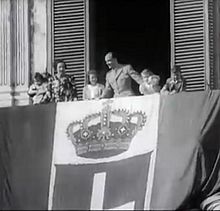
In the Salò Republic, Mussolini returned to his earlier idea of a republic. As part of his attacks on the House of Savoy, Fascist newspapers in the Salò Republic began to spread rumors about Umberto's personal life. They called him Stellassa ("Ugly Starlet" in the Piedmontese language). These newspapers reported on his relationships with men in a sensational way to make him look bad. It was after these reports in late 1943 that his personal life became widely known to the public.
As the Allies freed more and more of Italy, it became clear that Victor Emmanuel was too closely linked to Fascism to continue as king. A sign of how unpopular the House of Savoy had become was that on 28 March 1944, when the Italian Communist leader Palmiro Togliatti returned to Italy, he did not immediately push for a republic. He wanted the monarchy to continue as a way to gain support for the Communists after the war. For the same reason, Count Sforza wanted a republic as soon as possible. He argued that the House of Savoy was too connected to Fascism to be seen as legitimate. He believed that only a republic could establish a liberal democracy in Italy after the war.
By this time, the government of Badoglio was very unpopular. Umberto was willing to accept support from any party with many followers, even the Communists. Togliatti and Badoglio got along surprisingly well. This led to fears among liberal Italians that they might form an alliance between Italy's largest party and the military. Badoglio's government, based in Salerno, had limited power. However, when Communists and other anti-Fascist parties joined the government in April 1944, it marked a new phase in Italy's liberation. Besides the "institutional question," the government's main job was to rebuild the liberated areas of Italy. As the Allies moved north, the retreating Germans destroyed all the infrastructure. This caused a humanitarian disaster in the freed areas. Umberto and his father's government spent time trying to deliver aid.
Under strong pressure from Allied officials, Victor Emmanuel transferred most of his powers to Umberto on 10 April 1944. The King complained that Umberto was not qualified to rule. He said that giving power to Umberto was like letting the Communists take over. However, events were beyond Victor Emmanuel's control. After Rome was freed in June, Victor Emmanuel gave his remaining powers to Umberto. He named his son Lieutenant General of the Realm. However, Victor Emmanuel still kept the title of King. During his time as Regent, Umberto only saw his father three times. This was partly to create distance and partly due to tensions between them. Umberto was seen as more friendly and open than his father, but less experienced in politics. He was also more willing to learn.
As Regent, Umberto initially did not make a good impression. He surrounded himself with generals from the Fascist era. He spoke of the military as the source of his power. He often threatened to sue anyone who criticized the House of Savoy. He also asked the Allies to censor the press to prevent criticism of himself or his father. The British Foreign Secretary, Anthony Eden, wrote that Umberto was "the poorest of poor creatures." He felt Umberto's only qualification for the throne was that he was more charming than his father. The philosopher Benedetto Croce, a minister in Badoglio's government, called Umberto "entirely insignificant." He found the Prince of Piedmont shallow and not very smart. He also hinted that Umberto's private life was "tainted by scandal."
The diplomat and politician Count Carlo Sforza wrote that Umberto was completely unqualified to be King. He called the prince "a stupid young man who knew nothing of the real Italy." He also said Umberto was "as closely associated with fascism as his father. In addition he is weak and dissipated." An American official, Sam Reber, who knew Umberto before the war, met him in Naples in early 1944. He wrote that Umberto had "greatly improved," but had a "weak face" and lacked the personality to inspire confidence. More damaging, Victor Emmanuel let it be known that he regretted giving power to his son. He made it clear that he felt Umberto was unfit to succeed him, hoping to regain his own lost powers.
After Togliatti and the Communists joined Badoglio's government, taking oaths of loyalty to Umberto, other anti-Fascist parties felt they had to join too. They joined the government on 22 April 1944 to prevent the Communists from dominating. The Christian Democratic leader Alcide De Gasperi believed in 1944 that a public vote would immediately lead to a republic. Sources from the Vatican suggested only 25% of Italians supported the monarchy. The Catholic Church supported Umberto, who, unlike his father, was a sincere Catholic. They believed he would keep the Communists out of power. However, De Gasperi admitted that while the monarchy was a conservative institution, it had not done much to serve the country or people in the past thirty years.
Umberto's relationship with the Allies was difficult. He insisted that after the war, Italy should keep all its colonial empire, including Ethiopia and parts of Yugoslavia that Mussolini had taken. Both the British and Americans told Umberto that Ethiopia had regained its independence in 1941 and would not return to Italian rule. They also promised that Yugoslavia would return to its pre-war borders. Umberto later said he would never have signed the 1947 peace treaty, which made Italy give up its empire. On 15 April 1944, Umberto told The Daily Express that he hoped Italy would become a full Allied power. He wished the Italian navy would fight Japan and the Italian army would invade Germany with other Allied armies. He also said he wanted post-war Italy to have a government like the British monarchy, but with parts of America's political system. Umberto admitted that his father had made serious mistakes as King. He criticized Victor Emmanuel for a childhood where he was never allowed to express himself or have his own views. In the same interview, Umberto said he hoped to make Italy a democracy by creating "the vastest education programme Italy has ever seen" to end illiteracy.
A few days later, on 19 April 1944, Umberto told The Times that the Allies were too liberal in giving Italians too much freedom. He said they "seemed to expect the Italian people to run before they could walk." He demanded that the Allies censor the Italian press to stop criticism of the Royal Family. He also claimed he had no choice but to support Mussolini, or he would have lost his right to the throne. Finally, Umberto made the controversial statement that Mussolini "at first had the full support of the nation" when he brought Italy into the war in June 1940. He said Victor Emmanuel III only signed the declarations of war because "there was no sign that the nation wanted it otherwise. No single voice was raised in protest." This interview caused a lot of anger in Italy. Many Italians objected to Umberto's claim that ordinary Italians were responsible for entering the war. They also pointed out how hard it was to protest under the Fascist government in 1940.
Freedom and the Republic Debate
Most leaders of the Committee of National Liberation (CLN) in the north wanted a republic. However, they were willing to accept Umberto temporarily. They believed his personality and rumors about his private life would ensure he would not last long as Regent or King. After Rome was freed on 6 June 1944, Italian political parties pressured Umberto to dismiss Badoglio as Prime Minister. Badoglio had served the Fascist government until the King's coup in July 1943. Instead, the moderate socialist Ivanoe Bonomi was appointed Prime Minister. On 5 June 1944, Victor Emmanuel officially gave up his powers to Umberto, finally recognizing him as Lieutenant General of the Realm.
When Umberto returned to Rome after its liberation, he received a warm welcome from ordinary people. This friendly reception might have been because he symbolized a return to normal life after the harsh German occupation. During the German occupation, many Romans were starving. Young people were arrested and sent to Germany for forced labor. Fascist police and German forces committed many terrible acts. Badoglio, on the other hand, was met with hostility in Rome. Many Italians blamed him and the King for abandoning Rome to the Germans without a fight in September 1943.
Umberto had ordered Badoglio to include members of the CLN in his government after Rome's liberation. This was to broaden support and ensure national unity. Umberto moved into the Quirinal Palace. The CLN leaders in Rome refused to join the government as long as Badoglio was Prime Minister. However, they said Bonomi would be an acceptable choice. An Allied general convinced Umberto to accept Bonomi. He explained that the Crown needed the CLN in the government, which meant removing Badoglio. Umberto agreed to appoint Bonomi as Prime Minister. This was part of his effort to distance himself from Fascism. When the Bonomi cabinet was sworn in, Umberto allowed ministers to swear loyalty either to him as Lieutenant General or to the Italian state. Bonomi swore loyalty to Umberto, but the rest of his cabinet swore only to the Italian state.
Unlike the conservative Badoglio, the socialist Bonomi began to move Italian politics towards democracy. He argued that King Victor Emmanuel III, who only turned against Mussolini when the war was clearly lost, was unfit to continue as monarch. On 25 June 1944, Bonomi's government issued a Royal Decree in Umberto's name. It promised a Constituent Assembly for Italy after the war. As regent, Umberto surprised many with his growing maturity and judgment. Croce advised him to break with his father by choosing advisers from democratic parties. Because of Croce, Umberto appointed Falcone Lucifero, a socialist lawyer, as Minister of the Royal House. Lucifero suggested reforms, like reducing the number of aristocrats and generals at the Royal Court. He also suggested bringing in people from all regions of Italy, not just Piedmont, to make the court more representative.
In September 1944, Umberto stopped Bonomi's government from investigating who was responsible for abandoning Rome in September 1943. He feared it would show his father was a coward. The same month, Badoglio, who remained an adviser to Umberto, offered the British and Americans a plan. He suggested Italy be governed by three people: himself, Bonomi, and another former Prime Minister, Vittorio Orlando. This group would remove officials appointed by the CLN and restore civil servants who had served the Fascist government. Badoglio also spoke of Umberto's desire not to lose any territory to Greece, Yugoslavia, and France after the war. This offer was rejected.
In October 1944, Umberto told The New York Times that he preferred a referendum to decide if Italy should be a republic or a monarchy. He did not want the "institutional question" decided by the assembly that would write Italy's new constitution. Umberto's interview caused controversy. Republican parties feared a referendum would be rigged, especially in southern Italy. In the same interview, Umberto said he believed monarchies worldwide would move left after the war. He stated that under his leadership, Italy would move left "in an ordered, liberal way." He understood that "the weight of the past is the monarchy's greatest handicap." He said he would fix this by a "radical revision" of the Statuto Albertino. Umberto spoke favorably of Togliatti, calling him "clever, agreeable, and easy to discuss problems with."
By late 1944, the question of whether the CLN or the Crown represented the Italian people became very important. On 25 November 1944, Bonomi resigned as Prime Minister. He said he could not govern due to difficulties with the CLN. Since politicians could not agree on a successor, Umberto used this chance to strengthen the Crown's powers. The crisis ended on 12 December 1944. Umberto appointed a new government under Bonomi, with ministers from four parties, including Communists and Christian Democrats. Bonomi accepted the CLN's claim that they represented the Italian people. However, he still swore an oath of loyalty to Umberto as Lieutenant General when he became Prime Minister. Umberto tried to get Churchill to publicly support the monarchy. However, an Allied official warned Umberto to be more politically neutral as regent. Still, Churchill, during a visit to Rome in January 1945, called Umberto "a far more impressive figure than the politicians." To promote national unity after the war, Umberto appointed a well-known guerrilla leader, Ferruccio Parri, as Prime Minister in June 1945.
In December 1945, Umberto appointed a new, more conservative government led by Alcide De Gasperi. One of the first things the new government did was announce that the High Commission for Sanctions Against Fascism would stop operating on 31 March 1946. They also began removing civil servants appointed by the CLN in northern Italy. They restored career civil servants who had served the Fascist government to their old jobs. Despite opposition from left-wing parties, De Gasperi announced that a referendum would be held to decide if Italy would be a monarchy or a republic. At the same time, Italian women were given the right to vote and hold office for the first time. This was also opposed by left-wing parties. They believed Italian women were more conservative than men and that female suffrage would help the monarchists in the referendum. Monarchists wanted to delay the referendum as long as possible, hoping that a return to normal life would make Italians view the monarchy more favorably. Republicans wanted a referendum as soon as possible, hoping that wartime changes would help them.
King of Italy
Umberto received much praise for his role in the three years leading up to the referendum. The Italian historian Giuseppe Mammarella called Umberto a man "whose Fascist past was less compromising" than Victor Emmanuel's. As Lieutenant General of the Realm, Umberto showed some "progressive" tendencies. In April 1946, a poll of conservative Christian Democratic party members showed that 73% were republicans. This caused great panic among monarchists. The American historian Norman Kogan noted that this poll was of party members, not all voters, who tended to be more conservative. Still, the poll led Umberto to ask the Allies to postpone the referendum. He was told that the De Gasperi government had set the date, not the Allies. The possibility of losing the referendum also led monarchists to ask Victor Emmanuel to finally give up his throne. De Gasperi and other Christian Democratic leaders refused to take sides in the referendum. They urged Christian Democratic voters to follow their consciences.
Hoping to influence public opinion before the referendum on the monarchy, Victor Emmanuel formally gave up his throne to Umberto on 9 May 1946. He then left for Egypt. Before leaving, Victor Emmanuel said goodbye to Umberto in a cold way. The Catholic Church believed that keeping the monarchy was the best way to keep the Italian left out of power. During the referendum campaign, Catholic priests warned that "all the pains of hell" awaited those who voted for a republic. The Catholic Church presented the referendum not as a choice between republic and monarchy, but between Communism and Catholicism. They warned that voting for a republic meant voting for Communists. On 1 June 1946, the day before the referendum, Pope Pius XII gave a sermon. Many saw it as an endorsement of Umberto. He spoke about whether nations would continue to rely on Christianity or turn to a secular state without religion. Umberto believed the Catholic Church's support would be key and that he would win by a small margin. The De Gasperi government accepted Umberto as King but refused to use the traditional title "by the Grace of God and the will of the people."
In northern Italy, where there had been a guerrilla struggle against the Fascist Republic and the Germans, many people had strong feelings against the monarchy. Victor Emmanuel's flight from Rome was "bitterly remembered" in the North as an act of cowardice. The socialist leader Sandro Pertini warned Umberto not to campaign in Milan. He said Umberto would be attacked by the working class if he appeared there. Republican cartoonists made fun of Umberto's appearance. He was described as tall, stiff, and balding, with thin lips and a weak chin. He looked more like a butler than a king. On the campaign trail, Umberto was received much more warmly in southern Italy than in the north. People in the Mezzogiorno (southern Italy) loved their King. In Sicily, he showed a detailed knowledge of Sicilian villages, which made him very popular.
Umberto's main arguments for keeping the monarchy were that it was the best way to make Italy a great power again. He also said it was the only institution that could keep Italy united and support Catholicism against those who opposed the Church. Republicans argued that Umberto had done nothing to oppose Fascism. They said his main interest was his "glittering social life" in Rome and Turin. They also claimed that as a general, he knew Italy was not ready for war in 1940 but did not warn Mussolini against joining the war.
Some monarchists questioned if the referendum was fair. They claimed that millions of voters, many of whom supported the monarchy, could not vote because they had not returned to their home areas to register. Also, Italy's borders were not fully settled, so the voting rights of people in disputed areas were unclear. There were also claims of voter manipulation. Even how to count the votes became controversial.
On 2 June 1946, almost 90% of voters participated in the referendum. Over 54% voted to make Italy a republic. The conservative, rural Mezzogiorno (southern Italy) voted strongly for the monarchy. The more urban and industrial Nord (northern Italy) voted firmly for a republic. In northern Italy, the rumors about Umberto's personal life affected voters, causing some conservatives to vote for the republic. From his exile in Egypt, King Farouk welcomed Victor Emmanuel. Victor Emmanuel said he was not surprised by the referendum result. He always saw Umberto as a failure who was unfit to be King. He claimed that monarchists would have won if he had not given up his throne. Umberto himself expected to win and was very shocked when most of his people chose a republic.
The republic was officially declared four days later, ending Umberto's short 34-day reign as King. Umberto at first refused to accept what he called the "outrageous illegality" of the referendum. He took his removal badly. In his last official statement as King, Umberto refused to accept the republic. He said he was the victim of a coup d'état by his ministers and that the referendum had been rigged against him. Some monarchists suggested using force to prevent a republic, even risking civil war. But Umberto rejected this advice. He said, "My House united Italy. I will not divide it." The monarchy of the House of Savoy officially ended on 12 June 1946, and Umberto left the country. Prime Minister Alcide de Gasperi became Italy's temporary Head of State. Around 3 p.m. on 13 June 1946, Umberto left the Quirinal Palace for the last time. Servants gathered in the courtyard to see him off, many in tears. At Ciampino Airport in Rome, as Umberto boarded the plane to Lisbon, a carabiniere grabbed his hand and said, "Your Majesty, we will never forget you!"
In Exile
King Umberto II lived in exile for 37 years in Cascais, Portugal. He never returned to Italy. The 1948 constitution of the Italian Republic not only banned restoring the monarchy but also, until 2002, prevented all male heirs to the former Italian throne from returning to Italian soil. Female members of the Savoy family were not banned, except for former queens consort. Umberto's relationship with Queen Marie José became more strained during their exile. Their marriage effectively ended, with Marie José moving to Switzerland while Umberto stayed in Portugal. However, as Catholics, they never divorced.
When Umberto was dying in 1983, President Sandro Pertini wanted the Italian Parliament to allow Umberto to return to Italy. Umberto died in Geneva and was buried in Hautecombe Abbey, which has been the burial place for members of the House of Savoy for centuries.
Titles, Styles and Honours
| Styles of King Umberto II |
|
|---|---|
 |
|
| Reference style | His Majesty |
| Spoken style | Your Majesty |
Titles and Styles
- 15 September 1904 – 29 September 1904: His Royal Highness Prince Umberto of Savoy
- 29 September 1904 – 9 May 1946: His Royal Highness The Prince of Piedmont
- 9 May 1946 – 12 June 1946: His Majesty The King of Italy
- 12 June 1946 – 18 March 1983: His Majesty King Umberto II of Italy
Umberto was given the traditional title of Prince of Piedmont at birth. This was made official by a Royal Decree on 29 September 1904.
Honours
National Honours
 House of Savoy:
House of Savoy:
- Sovereign Knight of the Supreme Order of the Most Holy Annunciation, with Collar
- Sovereign Knight Grand Cross of the Royal Order of Saints Maurice and Lazarus
- Sovereign Knight Grand Cross of the Royal Order of the Crown
- Sovereign Knight Grand Cross of the Royal Military Order of Savoy
- Sovereign Knight Grand Cross of the Royal Civil Order of Savoy
- Sovereign Knight Grand Cross of the Royal Order of the Star of Italy
- Sovereign Knight of the Order of Merit for Labour
- Sovereign Knight Grand Cross of the Order of the Roman Eagle
 Sovereign Military Order of Malta:
Sovereign Military Order of Malta:
- Bailiff Grand Cross of Justice, Special Class, 17 November 1922
- Grand Cross of the Order of Merit, with Collar
 Two Sicilian Royal Family:
Two Sicilian Royal Family:
- Knight of Saint Januarius, with Collar
- Grand Cross of Justice of the Two Sicilian Royal Sacred Military Constantinian Order of Saint George, with Collar
 Tuscan Grand Ducal family:
Tuscan Grand Ducal family:
- Grand Cross of the Military Order of Saint Stephen
- Grand Cross of Saint Joseph
- SS Principe Umberto, a passenger and cargo ship built in 1908, named after him, sunk in 1916.
Foreign Honours
 Belgium: Grand Cordon of the Order of Leopold
Belgium: Grand Cordon of the Order of Leopold Bulgarian Royal Family:
Bulgarian Royal Family:
- Knight of Saints Cyril and Methodius
- Grand Cross of Saint Alexander, with Collar
 Denmark: Knight of the Elephant, 31 August 1922
Denmark: Knight of the Elephant, 31 August 1922 German Imperial and Royal Family: Knight of the Black Eagle, with Collar
German Imperial and Royal Family: Knight of the Black Eagle, with Collar
 Bavarian Royal Family: Knight of Saint Hubert
Bavarian Royal Family: Knight of Saint Hubert Hessian Grand Ducal Family: Knight of the Golden Lion, with Collar
Hessian Grand Ducal Family: Knight of the Golden Lion, with Collar
 Greek Royal Family:
Greek Royal Family:
- Grand Cross of the Redeemer
- Grand Cross of Saints George and Constantine, with Collar
 Monaco: Grand Cross of St. Charles, 16 January 1930
Monaco: Grand Cross of St. Charles, 16 January 1930 Montenegrin Royal Family: Grand Cross of the Order of Prince Danilo I, Special Class
Montenegrin Royal Family: Grand Cross of the Order of Prince Danilo I, Special Class Norway: Grand Cross of Saint Olav, with Collar, 19 August 1922
Norway: Grand Cross of Saint Olav, with Collar, 19 August 1922 Poland: Knight of the White Eagle
Poland: Knight of the White Eagle Portuguese Royal Family:
Portuguese Royal Family:
- Grand Cross of the Royal Military Order of Our Lord Jesus Christ
- Grand Cross of the Tower and Sword, with Collar
 Romanian Royal Family:
Romanian Royal Family:
- Grand Officer of the Order of Michael the Brave, 1st Class, 26 July 1943
- Grand Cross of the Order of Carol I, with Collar
 Russian Imperial Family: Knight of Saint Andrew the Apostle the First-called, with Collar
Russian Imperial Family: Knight of Saint Andrew the Apostle the First-called, with Collar
 Spain:
Spain:
- Knight of the Golden Fleece, 19 November 1923
- Grand Cross of the Order of Charles III, with Collar, 7 June 1924
 Sweden: Knight of the Seraphim, 7 September 1922
Sweden: Knight of the Seraphim, 7 September 1922 Thailand: Knight of the Order of the Royal House of Chakri, 26 March 1933
Thailand: Knight of the Order of the Royal House of Chakri, 26 March 1933 United Kingdom: Royal Victorian Chain, 1935
United Kingdom: Royal Victorian Chain, 1935 Yugoslavian Royal Family: Grand Cross of the Star of Karađorđe
Yugoslavian Royal Family: Grand Cross of the Star of Karađorđe Vatican: Grand Cross of the Holy Sepulchre of Jerusalem, with Collar
Vatican: Grand Cross of the Holy Sepulchre of Jerusalem, with Collar
 Holy See: Knight of the Supreme Order of Christ, with Collar, 2 January 1932
Holy See: Knight of the Supreme Order of Christ, with Collar, 2 January 1932
See Also
 In Spanish: Humberto II de Italia para niños
In Spanish: Humberto II de Italia para niños
- List of shortest reigning monarchs of all time
Images for kids
 | Selma Burke |
 | Pauline Powell Burns |
 | Frederick J. Brown |
 | Robert Blackburn |


